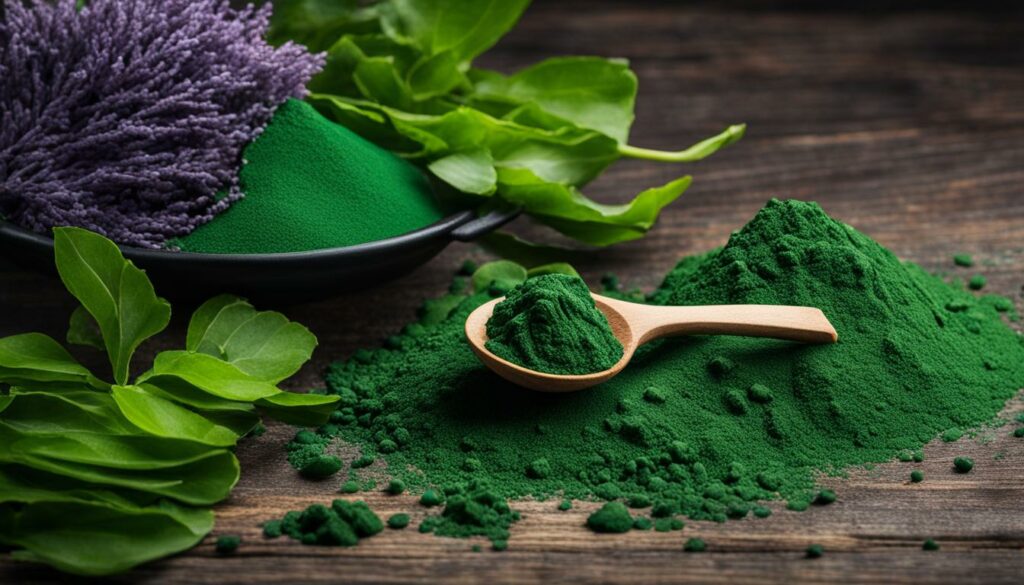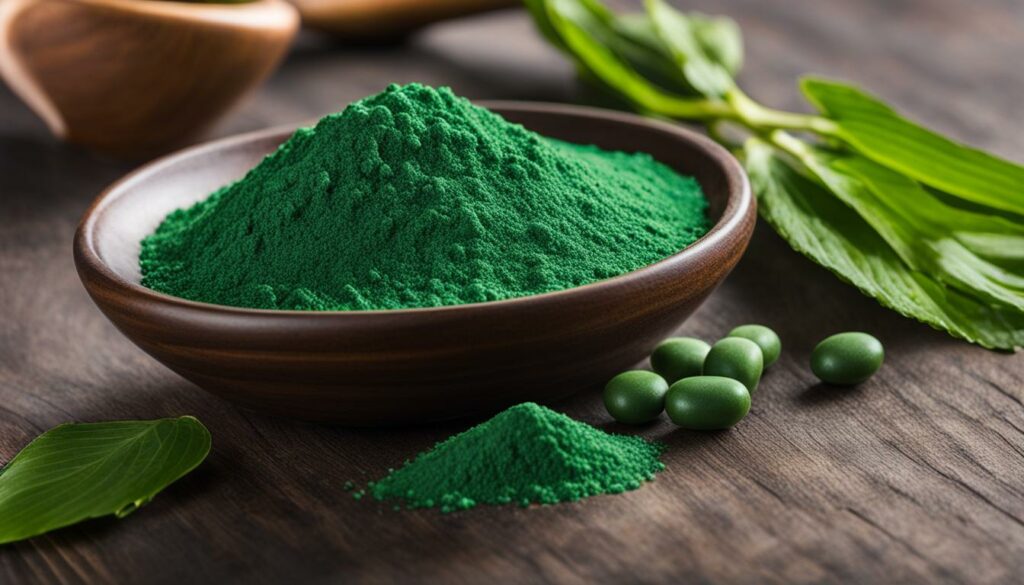Spirulina is a type of algae that offers numerous health benefits and is widely used as a supplement. Its rich nutrient content and antioxidant properties make it a popular choice for promoting overall health and well-being.
So, what does spirulina do to the body? Let’s explore the various ways spirulina can positively impact your health.
Spirulina is packed with essential nutrients such as protein, vitamins, and minerals. It contains thiamin, riboflavin, niacin, copper, and iron, among others. Additionally, spirulina is rich in phycocyanin, an antioxidant known for its powerful anti-inflammatory properties.
Studies have shown that spirulina can lower cholesterol and triglyceride levels, while also protecting LDL cholesterol from oxidation. Furthermore, it may possess anti-cancer properties and has been found to improve allergic rhinitis symptoms, support blood sugar control, and enhance muscle strength and endurance.
While spirulina offers numerous health benefits, it’s important to note that more research is needed to fully understand its effects on the body.
Key Takeaways:
- Spirulina is a type of algae that is widely used as a supplement due to its rich nutrient content and antioxidant properties.
- It is packed with essential nutrients such as protein, vitamins, and minerals.
- Spirulina has been found to lower cholesterol and triglyceride levels and protect LDL cholesterol from oxidation.
- It may possess anti-cancer properties and improve allergic rhinitis symptoms.
- Spirulina can support blood sugar control and enhance muscle strength and endurance.
Nutritional Value of Spirulina
Spirulina is highly nutritious and is considered a superfood. It is a rich source of protein, vitamins, and minerals. A single tablespoon of dried spirulina powder contains 4 grams of protein, as well as significant amounts of thiamin, riboflavin, niacin, copper, and iron. It also provides small amounts of magnesium, potassium, and manganese.
In addition to its nutritional content, spirulina is known for its immune-boosting properties. It contains compounds that can enhance the production of white blood cells and antibodies, thereby supporting the immune system.

| Nutrient | Amount per 1 tablespoon (dried) |
|---|---|
| Protein | 4 grams |
| Thiamin (Vitamin B1) | 11% of the Daily Value (DV) |
| Riboflavin (Vitamin B2) | 15% of the DV |
| Niacin (Vitamin B3) | 4% of the DV |
| Copper | 21% of the DV |
| Iron | 11% of the DV |
| Magnesium | 3% of the DV |
| Potassium | 1% of the DV |
| Manganese | 10% of the DV |
Health Benefits of Spirulina
Spirulina offers a range of health benefits that can support your overall well-being. Let’s explore two key benefits: weight loss and detoxification.
Weight Loss: If you’re looking to shed a few pounds, spirulina can be a helpful addition to your weight loss journey.
This superfood is low in calories and carbohydrates but rich in protein, making it an ideal choice for promoting satiety and reducing calorie intake. By incorporating spirulina into your diet, you can feel satisfied and full while consuming fewer calories, helping you achieve your weight loss goals.
Detoxification: Our bodies are exposed to various toxins through the food we eat, the air we breathe, and the environment we live in. Spirulina can aid in detoxification by supporting the body’s natural cleansing processes.
It contains powerful antioxidants that can protect against oxidative stress and reduce the risk of chronic diseases. Additionally, spirulina has the ability to bind to heavy metals and assist in their elimination from the body, further enhancing detoxification.
By incorporating spirulina into your daily routine, you can experience these health benefits and support your weight loss and detoxification goals.
Ready to learn more about the nutritional value of spirulina? Continue reading to discover the incredible nutrient content this superfood offers!
Other Potential Uses of Spirulina
In addition to its well-known health benefits, spirulina has been studied for its potential effects in other areas.
“Spirulina is a true superfood with a wide range of potential uses and benefits.”
1. Allergic Rhinitis Relief:
Spirulina may help improve symptoms of allergic rhinitis, such as congestion and itching, by reducing inflammation. The antioxidant properties of spirulina contribute to its anti-inflammatory effects, providing relief to individuals suffering from allergic rhinitis.
2. Anemia Management:
Research has shown that spirulina could play a role in managing anemia. Its high iron content may help increase hemoglobin and red blood cell production, potentially alleviating symptoms associated with anemia.
3. Muscle Strength and Endurance:
Athletes and fitness enthusiasts often turn to spirulina supplements to enhance muscle strength and endurance. Spirulina’s high protein content, coupled with its antioxidant and anti-inflammatory properties, may aid in muscle recovery and support overall athletic performance.
4. Blood Sugar Control:
Preliminary studies suggest that spirulina may be beneficial in supporting blood sugar control in individuals with type 2 diabetes. Some research indicates that spirulina can reduce fasting blood sugar levels, but further studies are needed to confirm these effects.

Potential Benefits of Spirulina Supplements:
| Benefit | Description |
|---|---|
| Allergic Rhinitis Relief | Spirulina’s anti-inflammatory properties may help alleviate symptoms of allergic rhinitis. |
| Anemia Management | Spirulina’s iron content may contribute to increased hemoglobin and red blood cell production, potentially helping manage anemia. |
| Muscle Strength and Endurance | Athletes can benefit from spirulina’s high protein content and antioxidant properties to enhance muscle recovery and improve performance. |
| Blood Sugar Control | Spirulina may aid in supporting blood sugar control in individuals with type 2 diabetes by reducing fasting blood sugar levels. |
Conclusion
Spirulina, a nutrient-dense algae, offers a wide range of health benefits. Its high protein content and antioxidant properties make it a valuable addition to any diet.
Numerous studies have shown promising results regarding spirulina’s effects on cholesterol levels, blood pressure, and immune function. While more research is needed to fully understand its mechanisms of action, incorporating spirulina into a balanced diet can be a beneficial way to support overall health and well-being.
It is important to note that before starting any supplement, including spirulina, it is crucial to consult with a healthcare provider to ensure its safety and suitability for your individual needs. While the potential health benefits of spirulina are significant, it is always best to seek professional advice to ensure proper usage.
By harnessing the power of spirulina and its multitude of health benefits, individuals can potentially enhance their well-being and lead a healthier lifestyle.
From supporting cardiovascular health to bolstering the immune system, spirulina has emerged as a popular natural supplement. Consider incorporating spirulina into your daily routine and unlock the potential benefits it can provide for your body and overall health.
FAQ
What are the health benefits of spirulina?
Spirulina offers numerous health benefits. It is rich in nutrients, including protein, vitamins, and minerals. It also has antioxidant properties and may help lower cholesterol and triglyceride levels.
Spirulina has anti-inflammatory properties and may even have anti-cancer effects. It can support the immune system, improve allergic rhinitis symptoms, aid in weight loss, and promote detoxification in the body.
What is the nutritional value of spirulina?
Spirulina is considered a superfood due to its high nutritional content. It is a rich source of protein, vitamins, and minerals. It contains significant amounts of thiamin, riboflavin, niacin, copper, and iron.
Spirulina also provides small amounts of magnesium, potassium, and manganese. In addition to its nutrient profile, spirulina has immune-boosting properties.
How can spirulina benefit weight loss and detoxification?
Spirulina is low in calories and carbohydrates but high in protein, which can aid in weight loss by promoting satiety and reducing calorie intake. It also contains antioxidants that can help protect against oxidative stress and supports the body’s detoxification processes.
Spirulina may bind to heavy metals and assist in their elimination from the body.
Are there other uses for spirulina?
Yes, spirulina has been studied for its potential effects in managing allergic rhinitis symptoms, improving muscle strength and endurance, and supporting blood sugar control in individuals with type 2 diabetes. However, more research is needed in these areas to confirm the effects of spirulina.
In conclusion, what does spirulina do to the body?
Spirulina is a nutrient-dense algae that offers numerous health benefits.
From its high protein content and antioxidant properties to its potential effects on cholesterol levels, blood sugar control, and immune function, spirulina has shown promising results in various studies. Incorporating spirulina into a balanced diet may be a beneficial way to support overall health and well-being.
It is important to consult with a healthcare provider before starting spirulina to ensure it is safe and appropriate for your individual needs.




